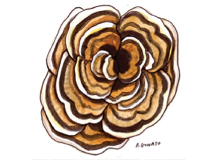The use of dietary supplements by patients with cancer has increased significantly over the past 20 years despite insufficient evidence of safety and effectiveness. Finding reliable sources of information about dietary supplements can be daunting. Patients typically rely on family, friends, and the Internet, often receiving misleading information.
The ASCO Post’s Integrative Oncology series is intended to facilitate the availability of evidence-based information on integrative and complementary therapies commonly used by patients with cancer. We chose Coriolus versicolor for this issue because of its increasing use by patients with cancer.
Compiled by Barrie R. Cassileth, PhD, and Jyothirmai Gubili, MS, Memorial Sloan Kettering Cancer Center. The free About Herbs website is managed by K. Simon Yeung, PharmD, MBA, LAc, Memorial Sloan Kettering Cancer Center.
Scientific name: Coriolus versicolor
Common names: Trametes versicolor, PSK, PSP, VPS, Turkey Tail, Yun Zhi, Kawaratake, Krestin
Overview
Coriolus versicolor, a mushroom found throughout the world, belongs to the class Basidiomycetes. Mushrooms are valued in traditional Oriental medicine for their health-promoting effects and are often combined with herbs to build strength and stamina and to treat disease.
Coriolus is popularly known as a turkey tail mushroom because of its resemblance to the multicolored tail of a wild turkey. It is used not as food but as medicine and has been part of traditional medicine as a tonic.
Polysaccharide K (PSK) and polysaccharide peptide (PSP), compounds extracted from Coriolus versicolor, are thought to be responsible for its immunomodulatory and anticancer effects. Clinical data indicate that polysaccharide K increases the survival rates of patients with certain cancers (see below under “The Science”) without causing major adverse effects. It is commonly used in Asian countries to complement standard cancer treatments.
Versicolor polysaccharide (VPS), another extract obtained from the mushroom, is also under investigation for its potential anticancer effects.
Coriolus versicolor is available in health food stores and on the Internet in the form of capsules, extracts, or teas. Extracts, including polysaccharide peptide and versicolor polysaccharide, are sold as dietary supplements in the United States.
The Science
Coriolus versicolor acts as a biologic response modifier. When used as an adjuvant, the proteoglycan polysaccharide K improved survival rates in patients with gastric1,2 and colorectal3-5 cancers. Polysaccharide peptide, used in conjunction with chemotherapy, has been shown to slow the progression of advanced non–small cell lung cancer.6
Coriolus extract by itself or in combination with other botanicals exerted positive immunomodulatory effects.7,8 However, studies of patients with breast cancer,9 hepatocellular carcinoma,10 and leukemia11 produced mixed results.
In another study, versicolor polysaccharide, a hot water extract of Coriolus, was found to enhance the development of large intestinal tumors in mice.12 More research is needed to determine the anticancer potential of Coriolus extracts.
Adverse Effects
Dark-colored stools,13 darkening of the fingernails,14 and low-grade hematologic and gastrointestinal toxicities have been reported following consumption of Coriolus along with chemotherapeutic agents.3
For additional information, visit the “About Herbs” website at https://www.mskcc.org/cancer-care/integrative-medicine/herbs/coriolus-versicolor. ■
Disclosure: Ms. Gubili reported no potential conflicts of interest.
References
1. Nakazato H, Koike A, Saji S, et al: Efficacy of immunochemotherapy as adjuvant treatment after curative resection of gastric cancer. Study Group of Immunochemotherapy with PSK for Gastric Cancer. Lancet 343:1122-1126, 1994.
2. Niimoto M, Hattori T, Tamada R, et al: Postoperative adjuvant immunochemotherapy with mitomycin C, futraful and PSK for gastric cancer: An analysis of data on 579 patients followed for five years. Jpn J Surg 18:681-686, 1988.
3. Ohwada S, Ikeya T, Yokomori T, et al: Adjuvant immunochemotherapy with oral Tegafur/Uracil plus PSK in patients with stage II or III colorectal cancer: A randomised controlled study. Br J Cancer 90:1003-1010, 2004.
4. Mitomi T, Tsuchiya S, Iijima N, et al: Randomized, controlled study on adjuvant immunochemotherapy with PSK in curatively resected colorectal cancer. The Cooperative Study Group of Surgical Adjuvant Immunochemotherapy for Cancer of Colon and Rectum (Kanagawa). Dis Colon Rectum 35:123-130, 1992.
5. Torisu M, Hayashi Y, Ishimitsu T, et al: Significant prolongation of disease-free period gained by oral polysaccharide K (PSK) administration after curative surgical operation of colorectal cancer. Cancer Immunol Immunother 31:261-268, 1990.
6. Tsang KW, Lam CL, Yan C, et al: Coriolus versicolor polysaccharide peptide slows progression of advanced non-small cell lung cancer. Respir Med 97:618-624, 2003.
7. Wong CK, Tse PS, Wong EL, et al: Immunomodulatory effects of yun zhi and danshen capsules in health subjects—A randomized, double-blind, placebo-controlled, crossover study. Int Immunopharmacol 4:201-211, 2004.
8. Wong CK, Bao YX, Wong EL, et al: Immunomodulatory activities of Yunzhi and Danshen in post-treatment breast cancer patients. Am J Chin Med 33:381-395, 2005.
9. Iino Y, Yokoe T, Maemura M, et al. Immunochemotherapies versus chemotherapy as adjuvant treatment after curative resection of operable breast cancer. Anticancer Res 15:2907-2911, 1995.
10. Suto T, Fukuda S, Moriya N, et al: Clinical study of biological response modifiers as maintenance therapy for hepatocellular carcinoma. Cancer Chemother Pharmacol 33:S145-S148, 1994.
11. Ohno R, Yamada K, Masaoka T, et al: A randomized trial of chemoimmunotherapy of acute nonlymphocytic leukemia in adults using a protein-bound polysaccharide preparation. Cancer Immunol Immunother 18:149-154, 1984.
12. Toth B, Coles M, Lynch J: Effects of VPS extract of Coriolus versicolor on cancer of the large intestine using a serial sacrifice technique. In Vivo 20:341-346, 2006.
13. Shiu WCT, Leung TWT, Tao M: A clinical study of PSP on peripheral blood counts during chemotherapy. Phytotherapy Res 6:217-218, 1992.
14. Kidd PM: The use of mushroom glucans and proteoglycans in cancer treatment. Altern Med Rev 5:4-27, 2000.
GUEST EDITOR
Integrative Oncology is guest edited by Barrie R. Cassileth, MS, PhD, Chief of the Integrative Medicine Service and Laurance S. Rockefeller Chair in Integrative Medicine at Memorial Sloan Kettering Cancer Center, New York.
The Integrative Medicine Service at Memorial Sloan Kettering Cancer Center developed and maintains a free website—About Herbs (www.mskcc.org/aboutherbs)—that provides objective and unbiased information about herbs, vitamins, minerals, and other dietary supplements, and unproved anticancer treatments. Each of the close to 300 and growing number of entries offer health-care professional and patient versions, and entries are regularly updated with the latest research findings.




